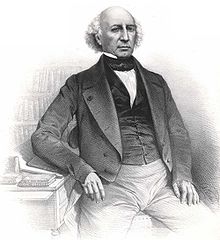- Toxicology
-
Toxicology (from the Greek words τοξικός - toxicos "poisonous" and logos) is a branch of biology, chemistry, and medicine concerned with the study of the adverse effects of chemicals on living organisms.[1] It is the study of symptoms, mechanisms, treatments and detection of poisoning, especially the poisoning of people.
See also: History of poisonDioscorides, a Greek physician in the court of the Roman emperor Nero, made the first attempt to classify plants according to their toxic and therapeutic effect.[2] Ibn Wahshiya wrote the Book on Poisons in the 9th or 10th century.[3]
Mathieu Orfila is considered to be the modern father of toxicology, having given the subject its first formal treatment in 1813 in his Traité des poisons, also called Toxicologie générale.[4]
In 1850 Jean Stas gave the evidence that the Belgian Count Hypolyte Visart de Bocarmé killed his brother-in-law by poisoning with nicotine[5]
Theophrastus Phillipus Auroleus Bombastus von Hohenheim (1493–1541) (also referred to as Paracelsus, from his belief that his studies were above or beyond the work of Celsus - a Roman physician from the first century) is also considered "the father" of toxicology.[6] He is credited with the classic toxicology maxim, "Alle Dinge sind Gift und nichts ist ohne Gift; allein die Dosis macht, dass ein Ding kein Gift ist." which translates as, "All things are poison and nothing is without poison; only the dose makes a thing not a poison." This is often condensed to: "The dose makes the poison" or in Latin "Sola dosis facit venenum".
The relationship between dose and its effects on the exposed organism is of high significance in toxicology. The chief criterion regarding the toxicity of a chemical is the dose, i.e. the amount of exposure to the substance. All substances are toxic under the right conditions. The term LD50 refers to the dose of a toxic substance that kills 50 percent of a test population (typically rats or other surrogates when the test concerns human toxicity). LD50 estimations in animals are no longer required for regulatory submissions as a part of pre-clinical development package.[citation needed]
The conventional relationship (more exposure equals higher risk) has been challenged in the study of endocrine disruptors.
Contents
Toxicity of metabolites
Many substances regarded as poisons are toxic only indirectly. An example is "wood alcohol," or methanol, which is chemically converted to formaldehyde and formic acid in the liver. It is the formaldehyde and formic acid that cause the toxic effects of methanol exposure. As for drugs, many small molecules are made toxic in the liver, a good example being acetaminophen (paracetamol), especially in the presence of chronic alcohol use. The genetic variability of certain liver enzymes makes the toxicity of many compounds differ between one individual and the next. Because demands placed on one liver enzyme can induce activity in another, many molecules become toxic only in combination with others. A family of activities that many toxicologists engage includes identifying which liver enzymes convert a molecule into a poison, what are the toxic products of the conversion and under what conditions and in which individuals this conversion takes place.
Subdisciplines of toxicology
There are various specialized subdisciplines within the field of toxicology that concern diverse chemical and biological aspects of this area. For example, toxicogenomics involves applying molecular profiling approaches to the study of toxicology.[7] Other areas include Aquatic toxicology, Chemical (pharmaceutical) toxicology, Ecotoxicology, Environmental toxicology, Forensic toxicology, and Medical toxicology.
Chemical (pharmaceutical) toxicology
Chemical or pharmaceutical toxicology is a scientific discipline involving the study of structure and mechanism related to the toxic effects of chemical agents, and encompasses technology advances in research related to chemical aspects of toxicology. Research in this area is strongly multidisciplinary, spanning computational chemistry and synthetic chemistry, proteomics and metabolomics, drug discovery, drug metabolism and mechanisms of action, bioinformatics, bioanalytical chemistry, chemical biology, and molecular epidemiology.
See also
- Aquatic toxicology
- Automatism (toxicology)
- Certain safety factor
- Children's Environmental Exposure Research Study (CHEERS) (in the US)
- Ecotoxicology
- Entomotoxicology
- Environmental toxicology
- Enzyme inhibition
- Forensic toxicology
- In vitro toxicology
- Indicative limit value
- Important publications in toxicology
- Overdose
- Pollution
- Toxic 100 (list of companies)
- Toxicity
- Toxicogenomics
- Toxicology Mechanisms and Methods (journal)
References
- ^ "What is Toxicology" -Schrager, TF, October 4, 2006
- ^ Ernest Hodgson (2010). "A Textbook of Modern Toxicology". John Wiley and Sons. p.10. ISBN 047046206X
- ^ Martin Levey (1966), Medieval Arabic Toxicology: The Book on Poisons of ibn Wahshiya and its Relation to Early Native American and Greek Texts
- ^ U.S. National Library of Medicine, Biography of Mathieu Joseph Bonaventure Orfila (1787–1853)
- ^ Wennig, Robert (Apr. 2009). "Back to the roots of modern analytical toxicology: Jean Servais Stas and the Bocarmé murder case". Drug Test Anal (England) 1 (4): 153–155. doi:10.1002/dta.32. PMID 20355192.
- ^ Paracelsus Dose Response in the Handbook of Pesticide Toxicology WILLIAM C KRIEGER / Academic Press Oct01
- ^ Afshari CA, Hamadeh HK (2004). Toxicogenomics: principles and applications. New York: Wiley-Liss. ISBN 0-471-43417-5.
Review: Omenn GS (November 2004). "Toxicogenomics: Principles and Applications". Environ Health Perspect 112 (16): A962. PMC 1247673. http://www.pubmedcentral.nih.gov/articlerender.fcgi?tool=pmcentrez&artid=1247673.
External links
- Toxicology at the Open Directory Project
Toxicology Fields Concepts Treatments Incidents Bradford · Minamata · Niigata · Alexander Litvinenko · Bhopal · 2007 pet food recalls · Seveso disaster · List of poisoningsRelated topics M: TOX
gen / txn
pto
ant
Categories:
Wikimedia Foundation. 2010.

